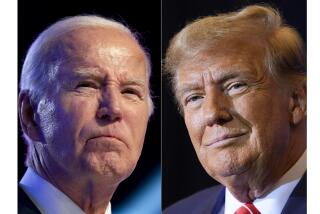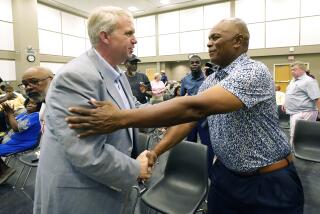If Gore Keeps on Losing, He Could Wind Up on Top
- Share via
WASHINGTON — No one has done a better job of losing than Tennessee Sen. Albert Gore Jr. As he finishes near the bottom in Democratic contests from New Hampshire to South Dakota, he manages to suggest that this is all part of the plan. He may yet have a point.
Certainly Gore has come out of New Hampshire facing the worst possible situation. Not only did he emerge as an “also ran” in the first two contests, but his major rivals in the South surfaced somewhat strengthened. Gore now looks toward the Southern vote on March 8--Super Tuesday--squeezed from the center by Rep. Richard A. Gephardt of Missouri, from the left courtesy of Jesse Jackson and from the Sunbelt suburbs by Massachusetts Gov. Michael S. Dukakis.
The questions looming before Gore involve momentum, message and money. Having at least publicly sworn off major efforts in the first two contests (while spending a lot of money in New Hampshire) can Gore jump-start his campaign in one day? Without the press coverage and credibility from early victories no one has done it before. Which is not the same as saying it can’t be done.
To do it Gore has to deliver a message beyond his current one. His theme of “I’m a Southerner, these other guys are unelectable liberals,” is unlikely to prove sufficient. There’s little evidence of a Southern pride vote and electability has not appeared as a key issue for Democratic voters in primaries. (In addition, a recent poll showed that 69% of Democrats in the South didn’t know what part of the country Gore is from.) While keeping the other candidates to the left on defense issues, Gore cannot concede populism to Gephardt. To do this he needs to spell out his own, primarily economic, vision of where he wants to take the country.
Even Gore’s much vaunted money is not enough to organize and reach the South over a few weeks. Having run a presidential campaign I can assure you that no one on the outside ever knows how much money a candidate has. Campaigns all exaggerate the amount of money they have. It evaporates quickly and is never enough. Gore’s money, no matter how much, is definitely not sufficient to blanket 14 states with expensive media buys. What Gore does have in abundance are expectations. Whereas Gephardt had to overcome high expectations in Iowa, and Dukakis had the same hurdle in New Hampshire, Gore has a 14-state expectation problem. The Southern and border states that vote on Super Tuesday are supposed to be his base. If that conservative vote isn’t there for Gore, then Gore isn’t going to be representing them at the Democratic convention.
Fortunately for the senator, these problems are only half the story. He’s also got assets. Gore has developed into a good candidate. He’s attractive, articulate and handles TV well. Even Gore’s mix of Harvard and grits may not be a disadvantage. The yuppie vote in high-tech areas of Virginia, North Carolina, Georgia and Florida may identify more with a young Southern senator than a New England governor.
Gore also has that hard-to-teach instinct for the jugular. (Remember his comeback during the recent Texas debate--”That sounds more like Dick Nixon than Dick Gephardt.”) His aggressiveness in debates has frequently been the lead for news stories the next day.
The Gore campaign has shown creativity both in its positions and strategy. His hard-line on foreign policy has distinguished him from other candidates and put them on the defensive. Downplaying Iowa and New Hampshire as unrepresentative early tests clearly made a virtue of necessity, but has been accepted as a reasonable argument.
Right now, the Democratic vote in the South is up for grabs. With the exception of Jackson, no Democratic candidate has a lock on any base vote in the South. Polls should be viewed with some suspicion. Most Southern voters have not yet focused on the race. Commitments to candidates, when they have them at all, are fluid. If Gore does a few things right, pressing his attack and presenting an attractive economic message, he can pick up more Southern delegates (as opposed to states) than any other candidate.
The Gore campaign should get the press concentrating on delegate totals as the key. Gore may do well in delegates while winning only a handful of states. Then, if he does win the most delegates on Super Tuesday, Gore could sound even more convincing as a candidate with the potential to win. If not, his best hope is a credible case as the party’s most attractive vice presidential candidate--at least a better job than losing.
More to Read
Get the L.A. Times Politics newsletter
Deeply reported insights into legislation, politics and policy from Sacramento, Washington and beyond. In your inbox twice per week.
You may occasionally receive promotional content from the Los Angeles Times.










